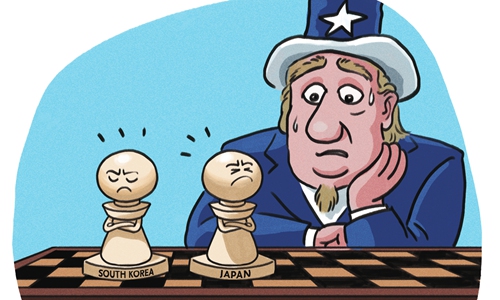Deteriorating Japan-S.Korea ties reveal declining US influence
By Wang Junsheng Source:Global Times Published: 2020/7/5 15:28:40

Illustration: Liu Rui/GT
Kim Dong-gi, ambassador and permanent delegate of the Republic of Korea to UNESCO, criticized Japan for not keeping its promise to honor the victims of wartime forced labor at its historic industrial sites, including Hashima Island, the Seoul-based Korea Herald reported on June 26. On June 28, Kyodo News reported that the Japanese government told the US that it opposed inviting South Korea to participate in the G7 summit.Since the Japanese government announced on July 1, 2019 that it would tighten export controls on three semiconductor core chemicals to South Korea, and it removed South Korea from its "white list" of trusted trading partners in August 2019, bilateral ties have become increasingly strained. The immediate cause lies in the historical problems and lack of basic trust between the two countries.
In December 2015, when former South Korean president Park Geun-hye was in office, Japan and South Korea reached an agreement on how to address the comfort women issue, but South Korea's public opinion was generally not supportive of it. After taking office, South Korean President Moon Jae-in said South Korea could not accept the agreement. Therefore, in Tokyo's view, the Moon administration cannot be trusted. Coupled with the wartime forced labor row and radar exposure issues in recent years, Japan-South Korea ties are getting worse.
The US has sufficient motivation to maintain good Japan-South Korea relations. On the one hand, Japan and South Korea are two important allies of the US in the Asia-Pacific region. According to 2019 statistics, over 170,000 soldiers were sent to military bases outside the US, of which about 55,000 were in Japan and more than 27,000 in South Korea. As for US international arms sales for the period of 2016-18, South Korea and Japan purchased $1.74 billion and $1.29 billion worth of weapons respectively, ranking the fourth- and eighth-largest buyers of the US weaponry.
On the other hand, the US garrison in South Korea is mostly ground force, complementing the bases dominated by the navy and air forces in Japan. They cooperate with each other to build the two wings of the US regional military alliance in Northeast Asia. The tension in Japan-South Korea relations is clearly not conducive to the US coordinating the two allies to unite in action.
Since last year, in the face of tensions in Japan-South Korea relations, the US has also actively coordinated more in the region. For example, US national security adviser John Bolton paid a visit to Japan and South Korea in July 2019 as the two countries were in the middle of their trade dispute. It is certainly necessary for the US to mediate between its two important Asian allies. However, although the US has made efforts to mediate, Japan-South Korea relations have become increasingly tense. This highlights the decline of US influence.
Since the Trump administration assumed power, it has withdrawn from a string of international pacts and organizations such as the Paris Agreement, UNESCO, UN Human Rights Council and so on. This is inconsistent with the aims of Tokyo and Seoul, both of whom are believed to advocate globalization. Trump's repeated withdrawals from international organizations and treaties have seen the US gradually lose moral ground to mediate between other countries, even its allies. Besides, the Trump administration not only has asked too much for sharing military expenses with South Korea and Japan, but also has intensified trade protectionism against them under the doctrine of "America First."
The US has taken tough measures (such as raising tariffs and initiating trade investigations) to suppress trade with Japan and South Korea, making it more difficult for their products to enter the US market. Moreover, the COVID-19 pandemic has hit the US hardest this year. As of the press time, deaths have exceeded 129,000.
As the protests caused by the death of George Floyd continue in the US, it can be said that the Trump administration has no time to take care of the conflicts between Tokyo and Seoul, leaving them adrift and angry with each other.
The author is a research fellow at the National Institute of International Strategy, Chinese Academy of Social Sciences. opinion@globaltimes.com.cn
Posted in: VIEWPOINT